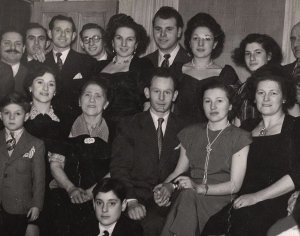Before liberation, a tormented flight
Marking 70 years of freedom from a Nazi concentration camp, a survivor recalls his late wifeʼs flight

Nathan and Helen Offen at their engagement party in London, 1950 (third and fourth from left). Nathan’s brothers Sam and Bernard are in the top row, second and third from left. Photo courtesy of Stephen Freedman.
Rounding age 92, Nathan Offen sounded slightly perturbed when rain canceled his tennis match this morning.
After missing his favorite outlet for about 18 months, a platelet-rich plasma treatment that Offen has been receiving in Florida seems to have paid off.
“It didnʼt cure me, but it took away most of the pain in my left knee,” he said in a gravelly voice. Renowned just a few years ago for mashing down younger opponents on the court, heʼs been able to play doubles again a few times this spring.
Offen is a Holocaust survivor who was liberated from Mauthausen 70 years ago today. On the verge of starvation, he weighed 50 or perhaps 60 pounds. He could barely feel the sores all over his body, and a respiratory infection was spreading as he tried to recover from a beating.
Looking out a small window from his rancid, second-tier bunk, the sun shining into his eyes, Nathan heard the rumble of vehicles. A few tanks with big white stars and half-tracks approached the gate, a platoon of the Eleventh Armored Division that came upon the concentration camp in Upper Austria by accident.
He and his older brother Sam were liberated by the 41st Cavalry Reconnaissance Squadron, Mechanized, on May 5, 1945. The Offensʼ younger brother Bernard was on a forced march from Lansdberg-Kaufering, a sub camp of Dachau near Munich, when German soldiers disappeared May 2, and he found some American GIs nearby.
Nathan Offen tries to not complain about much these days.
Heʼs thankful for more than having survived the Shoah. Nathan and his two brothers each endured slave labor at several concentration camps while more than 50 of their relatives were murdered.
The Offens grew up in Kraków, Poland, and each of the brothers came to the United States in 1951. Sam Offen settled in Detroit, raising a family and becoming a successful furrier, while educating thousands of students and adults across Michigan and the Upper Midwest about the Holocaust. He died in 2012.
Bernard Offen, who spends half the year in Kraków, is a documentary film maker who continues giving tours of the former ghetto and nearby camps, including Auschwitz, which he also survived.
He still knew that for both of them, their liberation came at a great cost.
Nathan raised three daughters in New Jersey and worked mostly as a pattern maker in New York Cityʼs garment district. Like each of his brothers, while confronting his memories later in his life, Nathan decided to remind the world in occasional talks and by writing a memoir.
“I am just grateful that I am still alive and can tell my story, that I am a witness to it,” he told me, speaking from his condominium in Delray Beach. “I am still alive, and my memory is still pretty good.”
Please click here to continue reading this post in Ken’s blog on Psychology Today.com. The story of how the Offens survived and confronted their trauma is a major part of my forthcoming book, The Ten-Year Quilt. This article is adapted from an excerpt.
